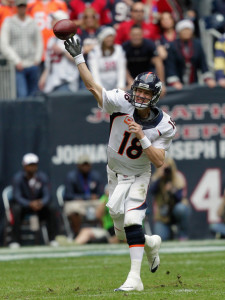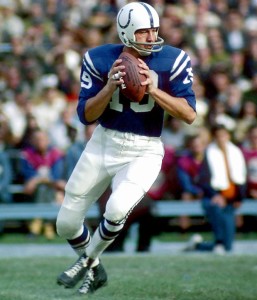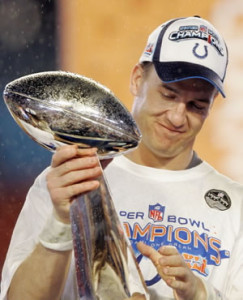Can Peyton Manning Finish His Climb to the Top of the NFL Quarterback Mountain?

At age 37 and just two years removed from major neck surgery, Peyton Manning is having arguably the finest season of his career.
After watching Peyton Manning toss four more touchdown passes against the Houston Texans to bring his season total to a new NFL record 51 with a game left in the season, it seems hard to believe that it was just 18 months ago that legitimate questions existed as to whether Manning would ever throw another pass in the NFL.
It is easy now to downplay the severity of his neck injury and the four surgeries that forced him to miss the entire 2011 season and put into play the events that have led him to Denver after spending his first 13 seasons in Indianapolis.
However, in the spring of 2012, it was not over-reacting to question if Manning would ever play in the NFL again, much less wonder if he could ever return to MVP form.
You might wonder now if the Indianapolis Colts might have made a different choice had they been able to look in their crystal ball and see that Manning was going to pass for 10,000 yards and 88 touchdown passes over the next two seasons. Would they have passed on quarterback of the future Andrew Luck to stay with the quarterback of the present in Peyton Manning?
I think if you ask Jim Irsay and the Colts, he would probably say “no”, and that his team made the difficult, but correct decision for the long-term success of his franchise.
Given that Luck has quickly developed into a top-12 NFL quarterback and has led the Colts to consecutive double digit-win seasons and playoff appearances, you have to believe him.
Plus, Irsay saw first-hand what can happen when the team no longer has the services of Manning during their 2-14 disaster campaign of 2011. So even though Manning has been the better player over these two seasons, I’m not sure he would have helped the Colts win many more games and at age 37, he has only so many more seasons left before he rides off into the sunset.
[poll id=”260″]
For the Colts, barring injury, they now have a starting quarterback who they can count on for another decade, much like they did Manning for the previous one.
But, just because Indianapolis doesn’t necessarily regret not having Peyton Manning doesn’t make his performance over the last two seasons any less impressive.
Even before his injury, Manning was generating much discussion about his place amongst the best quarterbacks in NFL history.
Because the game is much more passing oriented than in previous generations, just because a quarterback is putting up video game type stat lines doesn’t mean he is the greatest quarterback ever.
Consider for a second the NFL record for touchdown passes in a season.

In 1959 Johnny Unitas became the first quarterback in NFL history to throw for more than 30 touchdowns in a season.
In 1959, Johnny Unitas became the first quarterback in NFL history to pass for 30 or more touchdowns in a season. He tossed 32 scoring passes in a 12 game season to eclipse the previous record of 29 set by Frankie Albert in 1948.
That record didn’t last long as Sonny Jurgensen of the Philadelphia Eagles matched the NFL record in 1961 (the first season with 14 games) and George Blanda established a new professional football mark that same season with 36 touchdown passes for the Houston Oilers in the AFL.
In 1962, Y.A. Title of the New York Giants became the NFL’s single season leader with 33 touchdown passes and the next season he matched Blanda’s total with 36 touchdown passes.
That mark lasted for more than 20 years with very few challenges during an era in which power running was often the preferred offense. No quarterback tossed more than 28 touchdown passes in a single season in the 1970s. Steve Bartkowski with 31 touchdowns in 1980 and Dan Fouts with 33 in 1981 became the first quarterbacks since Daryle Lamonica had tossed 34 touchdowns in 1969 to throw for 30 or more touchdowns in a season.
Then in 1984 came along a powerful gunslinger named Dan Marino who blew the record out of the sky with 48 touchdown passes. Now by then the NFL was playing 16 games per season and some of the rules reducing the ability of defenders to touch receivers had been in place for several years, but Marino’s season with 48 touchdown passes and 5,082 yards was definitely one for the ages.
However, it didn’t signal an onslaught of touchdown passes as you might have expected.
With the exception of Marino’s own 44 touchdown season in 1986, it wasn’t until Brett Favre threw 38 touchdowns in 1995 and 39 the next season that another quarterback eclipsed the 36 touchdown mark for a season.

For Peyton Manning to go down as the greatest quarterback of all-time, he will need to win at least one more Super Bowl trophy.
However, since 1998 the 36 touchdown season has been matched or exceeded 17 times by 10 different quarterbacks. They include one current Hall of Famer in Steve Young (36 in 1998), five future Hall of Famers in Manning (three times, including the last two seasons), Tom Brady (three times, including becoming the first player to throw 50 touchdown passes in a season), Drew Brees (twice, with a chance to do it again in 2013 as he has 35 with one game left), Aaron Rodgers (twice) and Kurt Warner (twice) as well as four quarterbacks who had great seasons, but will likely never get a bust in Canton in Steve Beuerlein (36 in 1999 for Carolina), Daunte Culpepper (39 in 2004 for Minnesota), Tony Romo (36 in 2007) and Matthew Stafford (41 in 2011 for the Lions).
With his 51 touchdown passes this season, Manning is now the second quarterback to reach 50 touchdowns in a season. He also has joined Marino and Drew Brees as the only quarterbacks to pass for more than 40 touchdowns in a season twice.
Certainly there is much more to judging the success of a quarterback than simply looking at touchdown passes, but in this era in which the passing game is the preferred method of moving the football, it certainly is a big part of the game.
Besides the fact that he is now 37 years old and is just two years removed from a series of back surgeries, what makes Manning’s success over the last two years all the more impressive is that he has been able to limit his mistakes, despite everyone knowing that he is likely to throw the ball.
Over the last two seasons, he has tossed only 21 interceptions in 1,200 pass attempts. His interception rate of 1.8 percent over the last two years is below is career average of 2.6 percent and ranks close to the career 1.7% of Aaron Rodgers, who has the best percentage in NFL history.
Of course, we all know that what will ultimately determine if 2013 is a special season for Peyton Manning has nothing to do with what he does during the 16 game regular season. His seven touchdown passes in the season opener and nine games with four or more have been nice, but if he does not produce in the post season, it might just seal his legacy.
Despite all his regular season success, Dan Marino is rarely mentioned in the conversation for greatest quarterback of all-time because he never won a championship. While Peyton Manning does have one Super Bowl ring, so does Brad Johnson, Trent Dilfer, Mark Rypien and Doug Williams. Heck, his own brother, Eli, has two Super Bowl rings despite never posting huge stats or being a consistent star.
Much like Brett Favre, who won one title in Green Bay, but made too many mistakes in big moments to win another title, if Peyton Manning again falls short, it will keep him on the fringe of the conversation for “greatest quarterbacks of all-time” behind players with more rings including Brady, Joe Montana, John Elway, Roger Staubach and Unitas.
However, I believe that if Manning is able to overcome his past short-comings and lead Denver to the championship it will be the crescendo on one of the greatest seasons in NFL history and thrust him to the top of the mountain as the greatest quarterback in NFL history.
Thank you so much for posting this. I think this really puts things into a different light. I mean, I have read about this stuff before but the way you write just makes it clearer. If that makes sense
I wish more people would post valuable content like this. This is the first time I've been on your website, but after this, I doubt it will be the last time.
The post is written in very a good manner and it entails many useful information for me. I am happy to find your distinguished way of writing the post.